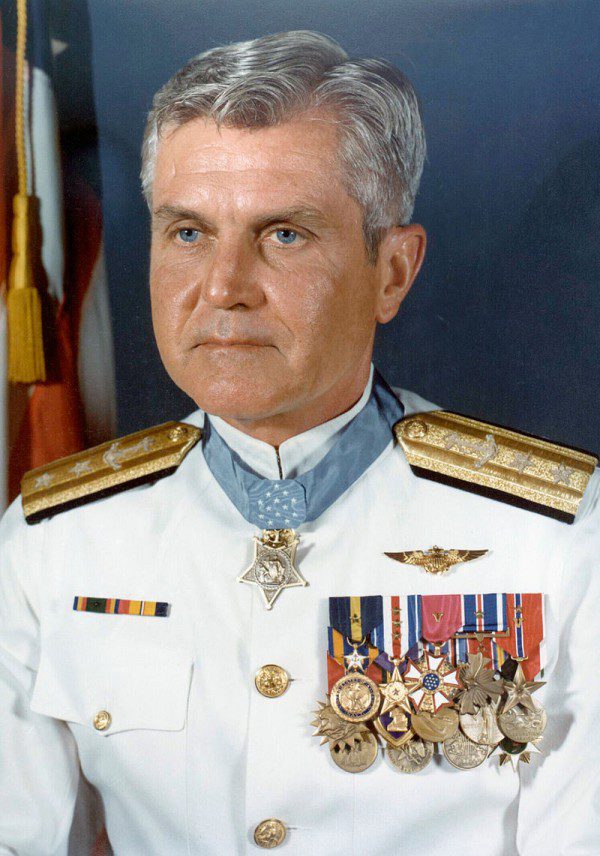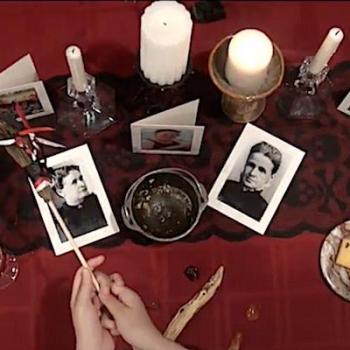As a fairly new Pagan, it seemed to me that Paganism’s Moment had finally arrived through the 1992 Presidential Campaign. That summer DeeDee Myers, then candidate Bill Clinton’s, Press Secretary revealed that her boss’s favorite book was Meditations by Marcus Aurelius. The book was reread every year or two and permanently stayed on Clinton’s nightstand. Too bad he didn’t apply the Stoic philosopher and Roman Emperor’s message of self-restraint a little more rigorously, or perhaps he could have avoided a lot of trouble later on from his behavior around one of his interns.

But there was someone involved in the Presidential race that year who not only lived out of a philosophy of Stoicism, but regularly credited it with have saved his life. This was Ross Perot’s Vice President choice, Vice Admiral James Stockdale. In September of 1965, he was shot down during a bombing raid over what was then North Vietnam and spent the next eight years as the highest ranking and one of the longest serving prisoners of war. It was in this arena, one of regular isolation and not infrequent torture that Stoicism proved itself invaluable to Stockdale.
A few years prior to this, as a grad student at Stanford University, Stockdale had been introduced to Stoicism, not thru Marcus Aurelieus, but through the writings of a former slave, Epictetus who had lived about a century before the Roman Emperor. He had started life as a crippled slave in what is today called Turkey, when at fifteen he was taken and sold to a secretary to Emperor Nero. His owner, Epaphroditus, became famous by cutting Nero’s throat when Nero blotched his own suicide (as soldiers were breaking down the door to arrest the Emperor.) With his owner otherwise occupied, Epictetus was left to his own devices and apprenticed to the best Stoic teacher in the empire at the time. After a bit over a decade, he became a philosopher in his own right, and a freeman. Scholars have calculated that in his works individual freedom is praised six times more frequently than in the Christian scriptures. He never wrote any books, as it was considered immodest to think your own lectures were worth immortalizing by pen and paper. Instead his students took down his words verbatim, and created eight books out of his lectures – four of these books still survive.
As a philosopher, Epictetus was sent the same sort of students that Socrates had received five centuries earlier, sons of wealthy families who generally thought that the world should be delivered to them on a silver platter. Epictetus made it clear from the outset that he would not teach them about “revenues or income, or peace or war, but about happiness and unhappiness, success and failure, slavery and freedom.” His model graduate wouldn’t make a living on the buzzwords of popular philosophy, but instead “speak about things that will do you good if your child dies, or your brother dies, of if you must die or be tortured.” “Let others practice lawsuits, other study problems, others syllogisms; here you practice how to die, how to be enchained, how to be racked, how to be exiled.”
Stoics belittle physical harm. Not because they’re cruel, but because it is something you don’t really have control over. They regarded as it being pretty useless to worry about stuff you can’t control. It would be the Stoic position that you can not control your fate, whether good or ill, but what you can control (and are responsible for) is how to respond to that fate – no matter how terrible that fate might be. This was the message that helped Stockdale survive over eight years in the Hanoi Hilton. He was not only an American prisoner of war there, but the highest ranking US officer in custody, which meant that he got extra “attention” from the Vietnamese and had responsibilities to the US prisoners, to help them survive their own ordeals. When the war wound down, they were released without much of any warning and brought back to a country that was *at best* ambivalent about the sufferings which they had endured.
While he had a lengthy and storied academic and military career, Stockdale’s political life was quite brief. He was not a great public debater and chose to introduce himself through Socratic inquiry with his opening question being “What Am I Doing Here?” The press, ever focused on the Lowest Common Denominator immediately jumped on this and branded him as the “clueless old man who doesn’t know why he’s running for VP.” That was something his campaign was never able to shake off. Despite his unfair treatment by the press (and unlike present day candidates) he never whined about his portrayal. But if you know his life story, you’ll understand why.
For a first-hand account of this please see Courage Under Fire: Test Epictetus’s Doctrines in a Laboratory of Human Behavior by James Bond Stockdale.
















